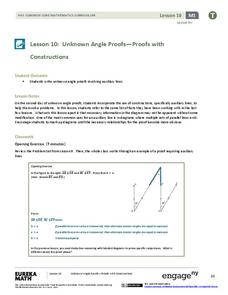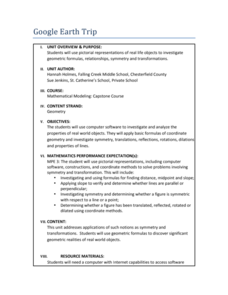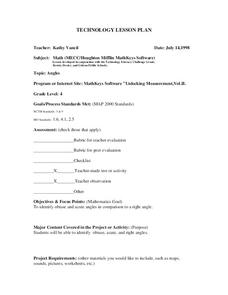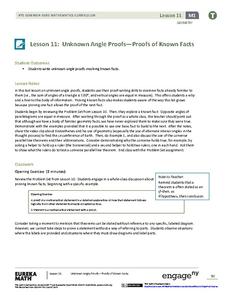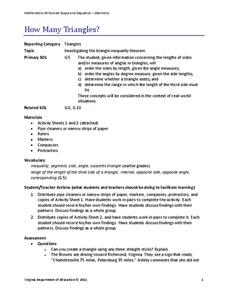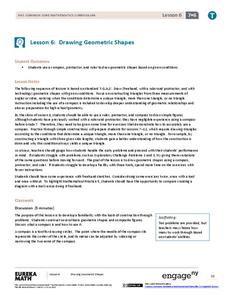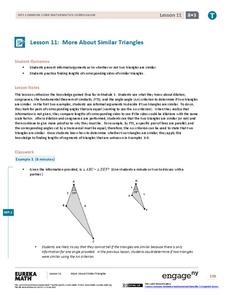Virginia Department of Education
Classifying Angles
Don't be obtuse, this geometry unit is the just the right resource for educating the acute young minds in your class. From classifying and measuring angles, to determining the congruence of shapes, this...
Virginia Department of Education
Angles, Arcs, and Segments in Circles
Investigate relationships between angles, arcs, and segments in circles. Pupils use geometry software to discover the relationships between angles, arcs, and segments associated with circles. Class members use similar triangles to...
EngageNY
Unknown Angle Proofs—Proofs with Constructions
Provide your emerging mathematicians with the tools to learn as they incorporate auxiliary lines to solve unknown angle proofs in this continuing segment. They decipher information from a diagram to uncover the missing pieces and...
EngageNY
Conditions for a Unique Triangle—Two Angles and a Given Side
Using patty paper, classes determine that only one triangle is possible when given two specific angle measures and a side length. As the 10th instructional activity in the series of 29, young math scholars add these criteria to those...
EngageNY
Conditions on Measurements That Determine a Triangle
Can any three side lengths create a triangle? Your classes tackle this question and more in the 11th lesson of the 29-part module. Through modeling with patty paper, individuals discover the relationship between the lengths of the sides...
Virginia Department of Education
Angles in Polygons
Polygons — it's all about the angles. Groups work with dynamic geometry software to find the sum of the measures of the angles of various polygons. After finding the information for several polygons, the groups generate a formula that...
Alabama Learning Exchange
Radians: Just Another Way
Serve up angle measurements on paper plates. Pupils use paper plates and paper-folding techniques to create a unit circle with conversions for special angles. Using their plates, learners explore the relationship between angle...
EngageNY
Solving for Unknown Angles Using Equations II
The third activity in the series of 29 asks learners to identify types of angles to verify angle relationships. They find unknown measures using vertical, adjacent, complementary, supplementary, and 360-degree angles.
EngageNY
Solving for Unknown Angles Using Equations
They say a picture is worth a thousand words—and your pupils may agree after this instructional activity! They read a geometric description and create a diagram from that description. Their diagrams help them find unknown measures based...
EngageNY
Solving for Unknown Angles Using Equations III
Challenge your classes to combine geometric and algebraic concepts with an activity that builds on concepts learned in the first three lessons of the series. The fourth part asks scholars to identify geometric angle relationships and use...
Radford University
Google Earth Trip
Travel the world instantly—and learn about math along the way. Using pictures of famous places taken from Google Earth, scholars look for parallel and perpendicular lines based on slope and angle measurements. They also calculate...
Curated OER
Angles
Learners identify obtuse and acute angles in comparsion to a right angle. They identify obtuse, acute, and right angles. Pupils use "Shape Measure" to construct obtuse, acute, and right angles. They review line segements to locate right...
EngageNY
Unknown Angle Proofs—Proofs of Known Facts
Lead the class in a Greek history lesson plan with a geometric twist. Pupils relate a short video about geometric properties to modern-day methods of solving for unknown angles. They discuss parallel line theorems and...
Radford University
Streets of Stephens City
Who has the best street smarts? An educational lesson has future mathematicians analyze street maps and measure angles on the map to determine if streets are parallel. They also consider safety issues at different types of intersections.
Virginia Department of Education
How Many Triangles?
Something for young mathematicians to remember: the sum of any two sides must be greater than the third. Class members investigates the Triangle Inequality Theorem to find the relationship between the sides of a triangle. At the...
EngageNY
Fundamental Theorem of Similarity (FTS)
How do dilated line segments relate? Lead the class in an activity to determine the relationship between line segments and their dilated images. In the fourth section in a unit of 16, pupils discover the dilated line...
EngageNY
Drawing Geometric Shapes
Learners build confidence working with geometric tools and develop their construction techniques in the sixth lesson plan of the 29-part series. Given a geometric description, they use a compass, protractor, or ruler to create it....
EngageNY
More About Similar Triangles
Determine whether two triangles are similar. The lesson presents opportunities for pupils to find the criterion needed to show that two triangles are similar. Scholars use the definition of similarity to find any missing side...
Radford University
Developing a Trigonometry Phone App
What's one more app? After reviewing how to calculate missing side lengths or angle measures in a right triangle, pupils create instructions for a phone app to do all of the tedious work. They must consider all nine cases of known...
Curated OER
Transformations in the Coordinate Plane
Your learners connect the new concepts of transformations in the coordinate plane to their previous knowledge using the solid vocabulary development in this unit. Like a foreign language, mathematics has its own set of vocabulary terms...
Mathematics Vision Project
Module 5: Circles A Geometric Perspective
Circles, circles, everywhere! Pupils learn all about circles, central angles, inscribed angles, circle theorems, arc length, area of sectors, and radian measure using a set of 12 lessons. They then discover volume formulas through...
Geometry Accelerated
Accelerated Geometry Review Sheet
Your geometry learners use their knowledge of various geometric concepts to write proofs. Starting with givens containing parallel line segments with transversals and triangles and quadrilaterals, and the mid-point and distance formulas;...
Radford University
How Much is in There? A Polygon Investigation
Try to find the triangles in various polygons. An investigation has learners develop a formula for the sum of the measures of the interior angles of a polygon. They use manipulatives to partition each polygon into triangles, then...
Radford University
Discover Radians!
No need for radians to be mysterious. Scholars use a cardboard cut-out of a unit circle and measure the radius and circumference using a piece of string. They consider the number of radii needed to cover the entire circumference and use...


